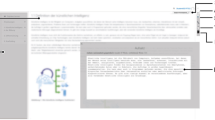Abstract
Adaptive scaffolding has been proposed as an efficient means for supporting self-directed learning both in educational as well as in adaptive learning systems research. However, the effects of adaptation on self-directed learning and the differential contributions of different adaptation models have not been systematically examined. In this paper, we examine whether personalized scaffolding in the learning process improves learning. We conducted a controlled lab study in which 29 students had to solve several tasks and learn with the help of an adaptive learning system in a within-subjects control condition design. In the learning process, participants obtained recommendations for learning goals from the system in three conditions: fixed scaffolding where learning goals were generated from the domain model, personalized scaffolding where these recommendations were ranked according to the user model, and random suggestions of learning goals (control condition). Students in the two experimental conditions clearly outperformed students in the control condition and felt better supported by the system. Additionally, students who received personalized scaffolding selected fewer learning goals than participants from the other groups.
Access this chapter
Tax calculation will be finalised at checkout
Purchases are for personal use only
Preview
Unable to display preview. Download preview PDF.
Similar content being viewed by others
References
Fischer, G., Scharff, E.: Learning technologies in support of self-directed learning. Journal of Interactive Media in Education 98(4), 1–32 (1998)
Lindstaedt, S., de Hoog, R., Ähnelt, M.: Supporting the Learning Dimension of Knowledge Work. In: Cress, U., Dimitrova, V., Specht, M. (eds.) EC-TEL 2009. LNCS, vol. 5794, pp. 639–644. Springer, Heidelberg (2009)
Simons, P.R.: Towards a constructivistic theory of self-directed learning. In: Straka, G.A. (ed.) Conceptions of self-directed learning, Waxmann, pp. 155–169 (2000)
Choo, C.W.: The knowing organization. How organizations use information to construct meaning, create knowledge, and make decision. Oxford University Press, New York (1998)
Mayer, R.E.: Should there be a three-strikes rule against pure discovery learning? The case for guided methods of instruction. American Psychologist 59(1), 14–19 (2004)
Narciss, S., Proske, A., Koerndle, H.: Promoting self-regulated learning in web-based environments. Computers in Human Behavior 23(3), 1126–1144 (2007)
Schnotz, W., Heiß, A.: Semantic scaffolds in hypermedia learning environments. Computers in Human Behavior 25(2), 371–380 (2009)
Müller-Kalthoff, T., Möller, J.: The Effects of Graphical Overviews, Prior Knowledge, and Self-Concept on Hypertext Disorientation and Learning Achievement. J. of Educational Multimedia and Hypermedia 12(2), 117–134 (2003)
Hogan, K., Pressley, M.: Scaffolding student learning: Instructional approaches and issues. Brookline Books, Cambridge (1997)
Hannafin, M., Land, S., Oliver, K.: Open learning environments: Foundations, methods, and models. In: Reigeluth, C.M. (ed.) Instructional design theories and models, pp. 115–140. Erlbaum, Mahwah/N.J (1999)
Vye, N., Schwartz, D., Bransford, J., Barron, B., Zech, L.: SMART environments that support monitoring, reflection, and revision. In: Hacker, D., Dunlosky, J., Graesser, A. (eds.) Metacognition in educational theory and practice, pp. 305–346. Erlbaum, Mahwah/N.J (1998)
Azevedo, R., Cromley, J., Seibert, D.: Does adaptive scaffolding facilitate students’ ability to regulate their learning with hypermedia? Contemp. Educ. Psych. 29, 344–370 (2004)
Brusilovsky, P., Peylo, C.: Adaptive and Intelligent Web-based Educational Systems. Int. J. of Artificial Intelligence in Education 13, 159–172 (2003)
Brusilovsky, P.: Adaptive Hypermedia. User Modeling and User-Adapted Interaction 11(1-2), 87–110 (2001)
Lindstaedt, S.N., Ley, T., Scheir, P., Ulbrich, A.: Applying Scruffy Methods to Enable Work-integrated Learning. Europ. J. of the Informatics Professional 9(3), 44–50 (2008)
Ley, T., Kump, B., Ulbrich, A., Scheir, P., Lindstaedt, S.N.: A Competence-based Approach for Formalizing Learning Goals in Work-integrated Learning. In: EdMedia 2008, pp. 2099–2108. AACE, Chesapeake/VA (2008)
Korossy, K.: Extending the theory of knowledge spaces: A competence-performance approach. Zeitschrift für Psychologie 205, 53–82 (1997)
Ley, T., Kump, B., Albert, D.: A methodology for eliciting, modelling, and evaluating expert knowledge for an adaptive work-integrated learning system. Int. J. of Human-Computer Studies 68(4), 185–208 (2010)
Lindstaedt, S., Beham, G., Kump, B., Ley, T.: Getting to Know Your User – Unobtrusive User Model Maintenance within Work-Integrated Learning Environments. In: Cress, U., Dimitrova, V., Specht, M. (eds.) EC-TEL 2009. LNCS, vol. 5794, pp. 73–87. Springer, Heidelberg (2009)
Brusilovsky, P., Karagiannidis, C., Sampson, D.: The Benefits of Layered Evaluation of Adaptive Applications and Services. In: Weibelzahl, S., Chin, D., Weber, G. (eds.) Empirical evaluation of adaptive systems, Workshop at the UM 2001, pp. 1–8 (2001)
Weibelzahl, S., Lauer, C.U.: Framework for the evaluation of adaptive CBR-systems. In: Vollrath, I., Schmitt, S., Reimer, U. (eds.) Experience Management as Reuse of Knowledge, GWCBR 2001, Baden-Baden, Germany, pp. 254–263 (2001)
Ghidini, C., Rospocher, M., Serafini, L., Faatz, A., Kump, B., Ley, T., Pammer, V., Lindstaedt, S.: Collaborative enterprise integrated modelling. In: EKAW 2008, pp. 40–42, INRIA, Grenoble (2008)
Falmagne, J., Cosyn, E., Doble, C., Thiery, N., Uzun, H.: Assessing mathematical knowledge in a learning space: Validity and/or reliability. Paper Presented at the Annual Meeting of the Am. Educational Research Association (2007)
Kump, B.: A Validation Framework for Formal Models in Adaptive Work-Integrated Learning. In: Nejdl, W., Kay, J., Pu, P., Herder, E. (eds.) AH 2008. LNCS, vol. 5149, pp. 416–420. Springer, Heidelberg (2008)
Kalyuga, S., Sweller, J.: Rapid dynamic assessment of expertise to improve the efficiency of adaptive e-learning. Educ. Technol. Research & Development 53(3), 83–93 (2005)
Author information
Authors and Affiliations
Editor information
Editors and Affiliations
Rights and permissions
Copyright information
© 2010 Springer-Verlag Berlin Heidelberg
About this paper
Cite this paper
Ley, T., Kump, B., Gerdenitsch, C. (2010). Scaffolding Self-directed Learning with Personalized Learning Goal Recommendations. In: De Bra, P., Kobsa, A., Chin, D. (eds) User Modeling, Adaptation, and Personalization. UMAP 2010. Lecture Notes in Computer Science, vol 6075. Springer, Berlin, Heidelberg. https://doi.org/10.1007/978-3-642-13470-8_9
Download citation
DOI: https://doi.org/10.1007/978-3-642-13470-8_9
Publisher Name: Springer, Berlin, Heidelberg
Print ISBN: 978-3-642-13469-2
Online ISBN: 978-3-642-13470-8
eBook Packages: Computer ScienceComputer Science (R0)




